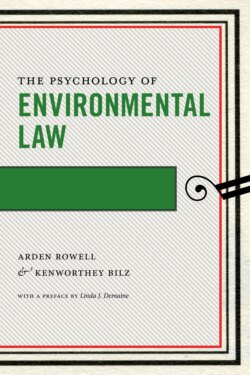Читать книгу The Psychology of Environmental Law - Arden Rowell - Страница 19
На сайте Литреса книга снята с продажи.
The Role of Roles in Decision Making
ОглавлениеBroadly speaking, psychology organizes its research by looking at the individual alone (in the subfields of personality, cognitive psychology, and the psychology of the self), the individual embedded in particular circumstances (classic social psychology), the dynamics of groups (as in research on social identity, group decision making, and interpersonal conflict), and finally, to a lesser extent, the psychology of social movements (research that more traditionally has been left to sociologists). Each of these contexts can affect the psychology of decision making.
In many, perhaps most, contexts, the impact of this context is the same in environmental law as in other areas of law. But sometimes the particular contexts in which environmental law arises are distinct and psychologically interesting. For instance, zoning and land use decisions tend to be made by local decision makers such as zoning boards, whereas climate change policies are often impacted by the decisions of international bodies like the United Nations. Generally, for a legal decision to be perceived as procedurally just, at a minimum people think they need a voice in the process (Lind & Tyler, 1988). But what counts as “voice” may vary dramatically in different settings. In a zoning decision, for example, citizens may expect to act in their individual capacity and to actually speak and tell their individual story to decision makers. Having a “voice” at the United Nations, however, may be satisfied by having one’s country’s ambassador, appointed by the executive, present and voting.
Motivation and decision making can interact with institutional roles in interesting ways as well. In particular, the goals of public institutions, who are charged with protecting public welfare, may motivate public actors differently than private actors, who often have profit motives (as with industry). These different motivations may impact the way that profit-oriented private and welfare-oriented public actors see the same environmental problem, even when both are operating with identical information. That said, not all private institutions are profit oriented; nonprofit institutions like the Sierra Club, the Center for Biological Diversity, and the Defenders of Wildlife play a formative role in many environmental legal contexts, and often their motivations may be more similar to agency actors than to industry actors. Understanding the way that motivations can affect perception of information may help to explain not only conflicts as they arise between public and private institutions in environmental law, but also the complex relationships that environmental nonprofits have traditionally had with other environmental legal actors.
In addition, insofar as many of the important actors within environmental law are comprised of largely like-minded individuals working to promote environmental quality, environmental law frequently implicates the psychology of group decision making. In particular, research suggests that groups tend to exhibit “polarization,” where “group members become even more aligned in the direction they were already tending” (Turner et al., 1987, p. 142). That is, a secret straw poll of the individual members of a group might have indicated that they were leaning somewhat toward a fairly modest environmental regulation. But for various psychological reasons, after open discussion, the group’s final decision is likely to lean strongly toward a more aggressive environmental regulation than their initial, individual inclinations would have been. Polarization can be a valuable lens for understanding the evolving decision making of environmental agencies, who are generally peopled by public-oriented civil servants, and even for contrasting this decision making with that of industry and of environmental nonprofits.
